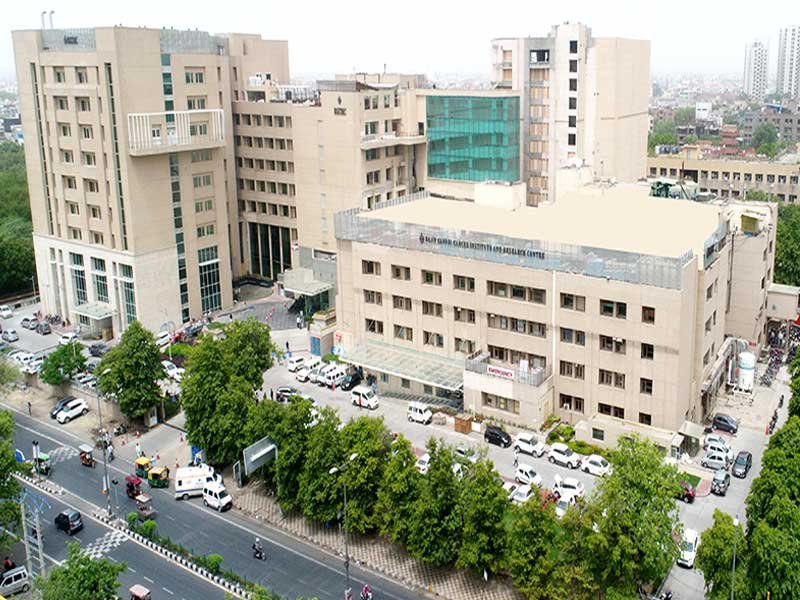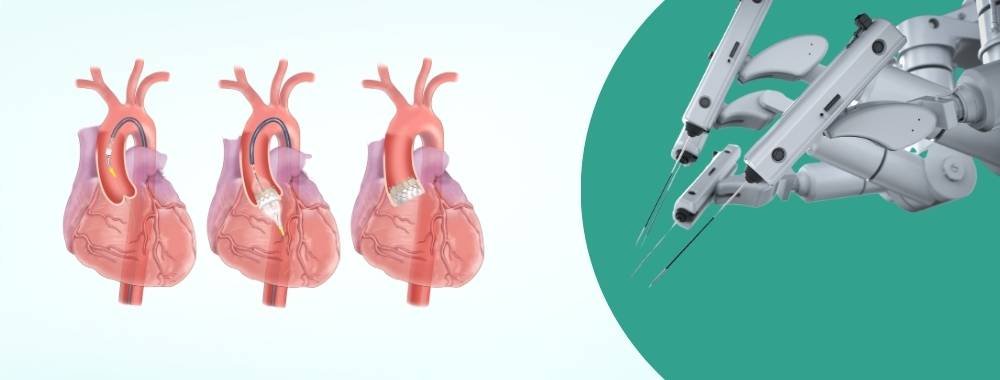Home Treatments Cardiology Transcatheter Aortic Valve Replacement (TAVR)
Are you concerned about the risks and costs of heart valve surgery?
TAVR, a transcatheter aortic valve replacement, is performed to replace the narrowed aortic valve.
It offers a minimally invasive solution for aortic valve replacement, reducing recovery time and risk compared to traditional surgery.
If you are struggling with high costs in your country, then India offers TAVR at affordable cost with advanced medical infrastructure, experienced surgeons, and the latest technologies which makes India the top choice for international patients seeking TVAR.
Choose India for quality care at an affordable cost and benefit from the expertise of leading cardiac specialists.
-cost-in-india.jpg)
Transcatheter Aortic Valve Replacement (TAVR) is a treatment to replace stenosed or regurgitant aortic valves.
Aortic stenosis is a condition where the aortic valve becomes stiff and narrow. This prevents the valve from fully opening, reducing blood flow to the body.
Aortic Regurgitation is a heart condition that occurs when the aortic valve doesn't close properly, causing blood to flow backward into the heart
Doctors may recommend TAVR if you have:
The cost of transcatheter aortic valve replacement is affordable compared to Western countries which includes surgical cost, diagnosis tests, rehabilitation if needed, follow-ups, and so on.
Cost Component | Details | Estimated Cost in USD |
Pre-operative Consultation & Diagnosis | Consultations, X-rays, MRI scans, blood tests | |
Surgery Costs | Includes surgeon fees, type of surgery, and hospital stay | |
Rehabilitation and Follow-up | Physiotherapy sessions, medications, supportive devices, follow-up visits |

Country | Cost Structure |
India | |
United States | |
Germany | |
Turkey |
◾Key Takeaways
✅ Affordable Treatment Cost: India offers affordable treatment solutions for international patients seeking TAVR where you can save up to 30% of the cost in Western countries.
✅ Advanced Medical Tecnologies: India uses some of the advanced technologies for treating TAVR for patient care to ensure faster recovery and better outcomes.
Transcatheter Aortic Valve Replacement (TAVR) cost
Treatment Name
Estimated Cost
Transcatheter Aortic Valve Replacement (TAVR) 35000-42000 USD
India offers high-quality care for Transcatheter Aortic Valve Replacement (TAVR), which includes:
Beds: 539
New Delhi
Beds: 230
New Delhi
Beds: 710
New Delhi
Beds: 650
New Delhi
Beds: 191
New Delhi
Beds: 310
New Delhi
Beds: 299
Gurugram
Beds: 380
New Delhi
Beds: 402
New Delhi
Beds: 1300+
Gurugram
Beds: 1000
New Delhi
Beds: 500
New Delhi
Beds: 450
Faridabad
Beds: 675
New Delhi
Beds: 500
New Delhi

Max Super Speciality Hospital, Saket

Aakash Healthcare Super Speciality Hospital

Indraprastha Apollo Hospital

BLK Max Super Speciality Hospital

Dharamshila Narayana Superspeciality Hospital

Fortis Escorts Heart Institute

Fortis Memorial Research Institute

Manipal Hospital Dwarka

Max Super Speciality Hospital Shalimar Bagh

Medanta - The Medicity Hospital

Moolchand Kharaiti Ram Hospital

Rajiv Gandhi Cancer Institute and Research Centre

Sarvodaya Hospital

Sir Ganga Ram Hospital

Venkateshwar Hospital

Necessary Diagnostic Tests
Tests | Description |
Echocardiogram | A painless test that uses sound waves to create an image of the heart, showing its size, shape, and how well it pumps blood. |
Electrocardiogram (EKG) | A quick test that records the heart's electrical signals to show how it's beating. |
Computed Tomography (CT) Scan | An imaging test is used to measure the aortic annulus and determine the size of the valve. |
Cardiac Catheterization | A procedure that measures blood flow in the heart and checks for any issues. |
🟢Do’s Before Surgery
✅ Follow Pre-Surgery Instructions: Carefully follow all instructions from your doctor about what to do and avoid, including dietary restrictions and medication guidelines.
✅ Stay Hydrated: Drink plenty of water if approved by your doctor, as it helps prepare your body for the procedure.
✅ Complete All Preoperative Tests: Ensure you complete all necessary pre-surgery tests, like blood tests, EKG, and imaging, to help the medical team prepare.
✅ Quit Smoking: Stop smoking a few weeks before surgery, as it can affect recovery and increase the risk of complications.
🔴Don’ts Before Surgery
❌ Don’t Eat or Drink Before Surgery: Follow fasting instructions and avoid eating or drinking 8–12 hours before surgery to prevent anesthesia complications.
❌ Don’t Take Certain Medications: Avoid blood-thinning medications and other medicines as directed, as they can increase bleeding risks during surgery.
❌ Don’t Use Tobacco or Alcohol: Refrain from smoking and drinking alcohol for at least 24 hours before surgery, as they can interfere with anesthesia.
❌ Don’t Wear Jewelry or Contact Lenses: Remove all jewelry, piercings, and contact lenses before arriving at the hospital to ensure a safe procedure.
Before the Surgery
During the Surgery
After the Surgery
Hospital Stays and Recovery
The hospital stay after transcatheter aortic valve replacement is usually 3–4 days, with recovery taking 2–3 weeks, depending on the patient’s condition.
The success rate for this procedure is generally around 90%, yet it depends on patients overall health.

Like other surgeries, TAVR has some possible complications which include
Why Choose Mejocare for Transcatheter Aortic Valve Replacement TAVR
✅ Team of Top Cardiac Surgeons: We recommend doctors with over 20 years of experience in cardiac procedures, including heart bypass surgery, TAVR, ICD implantation, and more.
✅ JCI/NABH Accredited Hospitals: We partner with hospitals featuring state-of-the-art facilities, equipped with advanced technologies like robotics, machine learning, and cutting-edge diagnostic and therapeutic equipment, all designed to offer you comprehensive and personalized care.
✅ Other Benefits: Mejocare provides various services, including medical visa invitation letters and guidance for visa procedures and formalities. From airport pickups and drop-offs to hotel bookings and 24/7 patient support, we ensure a seamless experience for international patients. Additionally, we offer hospitalization assistance, local SIM cards, and fit-to-fly certificates for patients ready to travel after treatment.
The TAVR procedure is healful for patients with narrowed aortic valves to give them a healthy life and get them back to their regular activities. The expert performs this surgery after taking various tests to diagnose the condition of the patient and then the surgery surgery is performed.
The average cost of TAVR surgery in India is 35000-42000 USD.
The success rate of TAVR Surgery in India is around 98%.
Expect a hospital stay of 3-5 days after TAVR surgery in India.
Most patients can resume normal activities within two weeks after TAVR surgery in India, a significantly quicker recovery compared to open-heart surgery.
The life expectancy after TAVR surgery in India is typically 10 to 20 years, based on the lifespan of the tissue valves used.
TAVR surgery in India entails risks like bleeding, vascular issues, valve complications, stroke, heart rhythm problems, pacemaker requirement, renal issues, and rare occurrences of death, heart attack, and infection. Research suggests similar risks for fatalities and strokes compared to surgical aortic valve replacement.
Yes, it is necessary to have a companion.
Wait for 72 hours post-TAVR surgery before driving and avoid strenuous exercise for 10 days to allow incisions to heal.
Yes, you can do your own research and choose your physical therapist.
Systemic analgesics are utilized for pain management after TAVR surgery in India.
Yes, insurance companies include the cost of TAVR surgery in India.
Patients can typically return to normal activities within 2 weeks post-surgery.
To discover the top doctors or hospitals in India, you can visit our website, mejocare on the doctors' page, you can filter and find the finest doctors, while on the hospital page, you can identify the best hospitals. Additionally, you can reach out to us, and we will gladly offer you all the necessary suggestions and information you need.
The TAVR surgery process typically takes about 90 minutes.
No, there is no waiting list for TAVR Surgery in India.
Yes, you may require an ECG, blood tests, and a chest X-ray before the surgery.
You can begin physical therapy 10 days post-TAVR surgery.
General anesthesia is used during TAVR surgery in India.
Post-TAVR surgery, stick to a heart-healthy diet: low-sodium, low-saturated fat, high-fiber, omega-3-rich foods. Avoid beef, pies, butter, sausages, and pastries; prioritize fruits, veggies, oily fish, and whole grains. Cut down on sodium intake.
Yes, you can resume climbing stairs 10 days after TAVR surgery in India.
Post-hospital care includes vital monitoring, complication prevention, dressing and diet management, discharge planning, and cardiac rehabilitation.
Our care team can help you.
